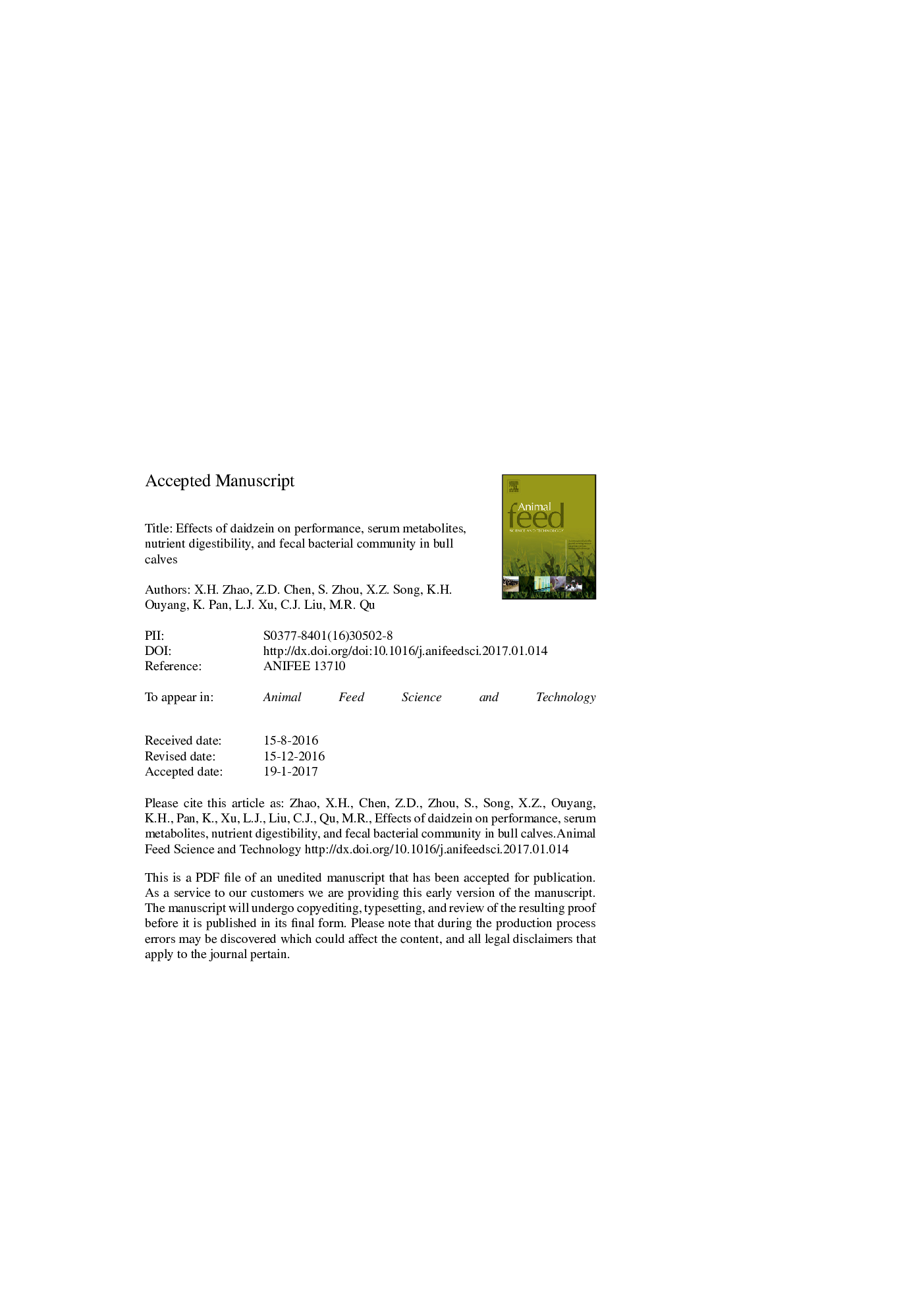| کد مقاله | کد نشریه | سال انتشار | مقاله انگلیسی | نسخه تمام متن |
|---|---|---|---|---|
| 5538759 | 1552361 | 2017 | 36 صفحه PDF | دانلود رایگان |
عنوان انگلیسی مقاله ISI
Effects of daidzein on performance, serum metabolites, nutrient digestibility, and fecal bacterial community in bull calves
ترجمه فارسی عنوان
اثر دایدزین بر عملکرد، متابولیت های سرم، قابلیت هضم مواد مغذی و جامعه باکتری مدفوع در گوسفندان گاو
دانلود مقاله + سفارش ترجمه
دانلود مقاله ISI انگلیسی
رایگان برای ایرانیان
کلمات کلیدی
IGF-IT-SODNDFADGHDL-CLDL-CADFMDAGSH-Px - GSH-PXinsulin-like growth factor I - انسولین مانند عامل رشد IFecal bacteria - باکتری مدفوعthyroxine - تیروکسینDaidzein - داایدزینtotal superoxide dismutase - سوپراکسید دیسموتاز کلGrowth performance - عملکرد رشدneutral detergent fiber - فیبر مواد شوینده خنثیhigh-density lipoprotein cholesterol - لیپوپروتئین پرچگالی یا اچدیالorganic matter - ماده آلیdry matter - ماده خشکmalonyldialdehyde - مالونی دی آلدئیدSerum metabolites - متابولیت های سرمaverage daily gain - متوسط افزایش روزانهProtein digestibility - هضم پروتئینGrowth hormone - هورمون رشدbody weight - وزن بدنcrude protein - پروتئین خامLow-density lipoprotein cholesterol - کلسترول لیپوپروتئین با چگالی کمglutathione peroxidase - گلوتاتیون پراکسیدازBull calves - گوساله ها
موضوعات مرتبط
علوم زیستی و بیوفناوری
علوم کشاورزی و بیولوژیک
علوم دامی و جانورشناسی
چکیده انگلیسی
An experiment was conducted to determine the effects of soy isoflavone daidzein on growth performance, serum metabolites, nutrient digestibility, and fecal bacterial community in bull calves. Twenty bull calves (138.9 ± 12.1 kg) were used in a 60-d feeding study. These calves were stratified by weight into groups and randomly allotted by group to one of four dietary groups including supplemental 0 (control), 100, 200, and 400 mg daidzein/kg feed, respectively. The average daily gain was increased significantly by supplemental daidzein (P < 0.001), and the largest difference occurred between the control and 400 mg/kg groups (126.6 g/d). On d 30, supplemental daidzein tended to increase serum IgM (P = 0.066) and IgA (P = 0.096) levels, reduced and tended to reduce serum thiiodothronine (P = 0.008) and thyroxine (P = 0.078) levels; the 400 mg/kg group had greater serum IgG level (P = 0.002) and lower high-density lipoprotein cholesterol concentration (P = 0.016) than control group. On d 60, supplemental daidzein reduced serum glucose concentration (P = 0.008), increased and tended to increase the activities of total superoxide dismutase (P = 0.001) and glutathione peroxidase (P = 0.058); the serum IgM, growth hormone, and insulin-like growth factor I levels were increased by 17.0% (P = 0.002), 18.8% (P = 0.014) and 26.5% (P = 0.002), respectively, in the 400 mg/kg group relative to control group. Supplemental daidzein increased the total tract apparent digestibility of crude protein (P = 0.029). Compared with control group, 200 and 400 mg/kg groups increased or tended to increase the relative abundance of fecal bacteria belonging to genus Desulfovibrio (P = 0.003), Peptococcus (P = 0.046), Intestinimonas (P = 0.095), Ruminobacter (P = 0.093), and Ruminococcaceae_UCG-010 (P = 0.073), and reduced the abundance of genus Bacteroidales_S24-7_group_norank (P = 0.001) and Parabacteroides (P = 0.023). The 100 mg/kg group increased the abundance of genus Dorea (P = 0.047) and Prevotellaceae_UCG-003 (P = 0.032), and tended to reduce the abundance of genus Ruminococcaceae_UCG-005 (P = 0.058) and Ruminococcaceae_UCG-014 (P = 0.084) relative to control group. This study demonstrates that supplementation with daidzein in diets could enhance antioxidant and immune capacities, change gastrointestinal microbial populations, promote dietary protein digestion, and improve production performance of bull calves. Daidzein should be a promising feed additive for growth of beef cattle.
ناشر
Database: Elsevier - ScienceDirect (ساینس دایرکت)
Journal: Animal Feed Science and Technology - Volume 225, March 2017, Pages 87-96
Journal: Animal Feed Science and Technology - Volume 225, March 2017, Pages 87-96
نویسندگان
X.H. Zhao, Z.D. Chen, S. Zhou, X.Z. Song, K.H. Ouyang, K. Pan, L.J. Xu, C.J. Liu, M.R. Qu,
